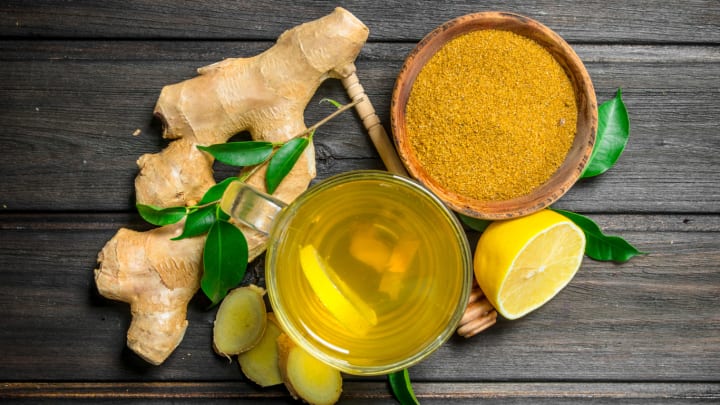Everything You Need to Know About the Common Cold: Causes, Symptoms, and recipes
You need to know about the common cold, including its causes, symptoms, and traditional home remedies and recipes to alleviate the symptoms and boost the immune system.

The common cold is a viral infection of the upper respiratory tract, including the nose, throat, and sinuses. It is caused by a variety of viruses, with rhinoviruses being the most common. Symptoms include runny nose, sore throat, cough, congestion, and sneezing.
In some cases, there may also be a low-grade fever, headache, and body aches. The common cold is most often spread through contact with respiratory secretions from an infected person, such as through sneezing or coughing.
The best way to prevent the common cold is to practice good hygiene, such as washing your hands frequently and avoiding close contact with people who are sick. If you have a cold, there is no cure, but medications can help relieve the symptoms. These include decongestants, pain relievers, and antihistamines. It is also important to get plenty of rest and drink fluids to stay hydrated.
In most cases, the common cold will go away on its own within a week or two. However, if symptoms persist or you develop complications, such as a high fever or severe cough, it's best to seek medical attention.
It is worth noting that while the common cold and COVID-19 share some symptoms, they are caused by different viruses, and COVID-19 can be more severe. If you have concerns about whether your symptoms are related to COVID-19, please contact a healthcare provider.
What are the symptoms of a cold?

Symptoms of a common cold include:
- Runny nose: This is often one of the first symptoms of a cold. The nose produces clear, thin mucus, which becomes thick and cloudy as the cold progresses.
- Sore throat: This can be caused by backdrop of mucus from the nose.
- Coughing: This is a common symptom of a cold, as the body tries to clear mucus and other debris from the lungs.
- Congestion: This is a feeling of nasal congestion or sinus congestion.
- Sneezing: This is a reflex that helps clear mucus and other irritants from the nasal passages.
- Low-grade fever: This is a mild increase in body temperature, usually below 101°F (38.3°C).
- Headache: This can be caused by inflammation of the nasal passages and sinuses.
- Fatigue: This is a common symptom of a cold as the body's immune system fights the infection.
- Body aches: This can be caused by inflammation and congestion in the nasal passages and sinuses.
It's worth noting that the symptoms of a cold vary from person to person, and can be similar to other conditions such as the flu. If you're not sure whether you have a cold or something else, it's best to consult a healthcare provider.
What’s the difference between a cold and the flu?
A cold and the flu (influenza) are both respiratory illnesses, but they are caused by different viruses. The common cold is usually caused by a variety of viruses, with rhinoviruses being the most common. The flu is caused by the influenza virus.
While the symptoms of a cold and the flu can be similar, the flu is generally more severe and can lead to more serious complications. The symptoms of the flu include:
- High fever: This is a fever of 101°F (38.3°C) or higher, and is one of the most common symptoms of the flu.
- Cough: A dry, hacking cough is a common symptom of the flu.
- Sore throat: This can be caused by the postnasal drip of mucus from the nose.
- Fatigue: This can be severe and can last for several weeks.
- Body aches and headaches: These can be severe and can be accompanied by chills and sweating.
- Runny nose and congestion: These symptoms are typically less severe in the flu than in a cold.
- Nausea, vomiting, and diarrhea: These symptoms are more common in children and young adults than in adults.
The common cold typically has milder symptoms and shorter duration, and it is not typically associated with high fever and body aches.
Diagnosing and treating the common cold
A cold is usually diagnosed based on the symptoms, as there is no specific test for a cold. A healthcare provider may also perform a physical examination to rule out other conditions that have similar symptoms, such as the flu or a sinus infection.
There is no cure for the common cold, but over-the-counter medications can help relieve symptoms. These include:
- Decongestants: These can help relieve nasal congestion and stuffiness.
- Pain relievers: These can help alleviate headaches and body aches.
- Anti-inflammatory medication: These can help reduce inflammation in the nasal passages and sinuses.
- Antihistamines: These can help relieve sneezing, runny nose, and itching of the nose and eyes.
- Cough suppressants: These can help suppress a dry cough.
It is important to follow the instructions on the label and not to exceed the recommended dosage.
In addition to medication, it is important to get plenty of rest, drink fluids to stay hydrated, and use a humidifier to help relieve congestion.
If symptoms persist or you develop complications, such as a high fever or severe cough, it's best to seek medical attention. A healthcare adviser may also prescribe antibiotics if there is a secondary bacterial infection, but it is worth noting that antibiotics are not effective against viral infections such as the common cold.
Preventing the spread of colds is also important, by covering your mouth and nose when you cough or sneeze, washing your hands frequently, and avoiding close contact with people who are sick.
Indian Recipes for cold and cough

There are several traditional Indian remedies and recipes that can help alleviate the symptoms of a cold and boost the immune system. Here are a few examples:
- Turmeric Milk: Turmeric is one of the spices and is commonly used as medicine and it has anti-inflammatory and antioxidant properties. To make turmeric milk, heat a glass of milk with a teaspoon of turmeric powder and a pinch of black pepper. Drink this before going to bed for a few days when you have cold symptoms.
- Ginger and Honey: Ginger has anti-inflammatory properties and honey has antibacterial properties. Crush a small piece of ginger and mix it with a tablespoon of honey. Have it 2-3 times a day when you have a cold.
- Tulsi (Holy Basil) and Ginger Tea: Tulsi is a herb that has antiviral properties and ginger has anti-inflammatory properties. Boil a cup of water with a few tulsi leaves and a small piece of ginger. Strain and drink the tea when it is warm.
- Garlic: Garlic has antiviral and antibacterial properties. Eating 2-3 raw garlic cloves a day will help in relieving cold symptoms.
- Chicken Soup: Chicken soup is a traditional remedy for a cold. It is said to help clear congestion and soothe a sore throat. You can make a traditional Indian chicken soup by adding ginger, garlic, and Indian spices like cumin and coriander to your soup.
- Haldi (Turmeric) and Ghee: Mix a teaspoon of turmeric powder with a tablespoon of ghee and have it before going to bed. This will help in relieving cold symptoms and also helps in getting good sleep.






Comments
There are no comments for this story
Be the first to respond and start the conversation.